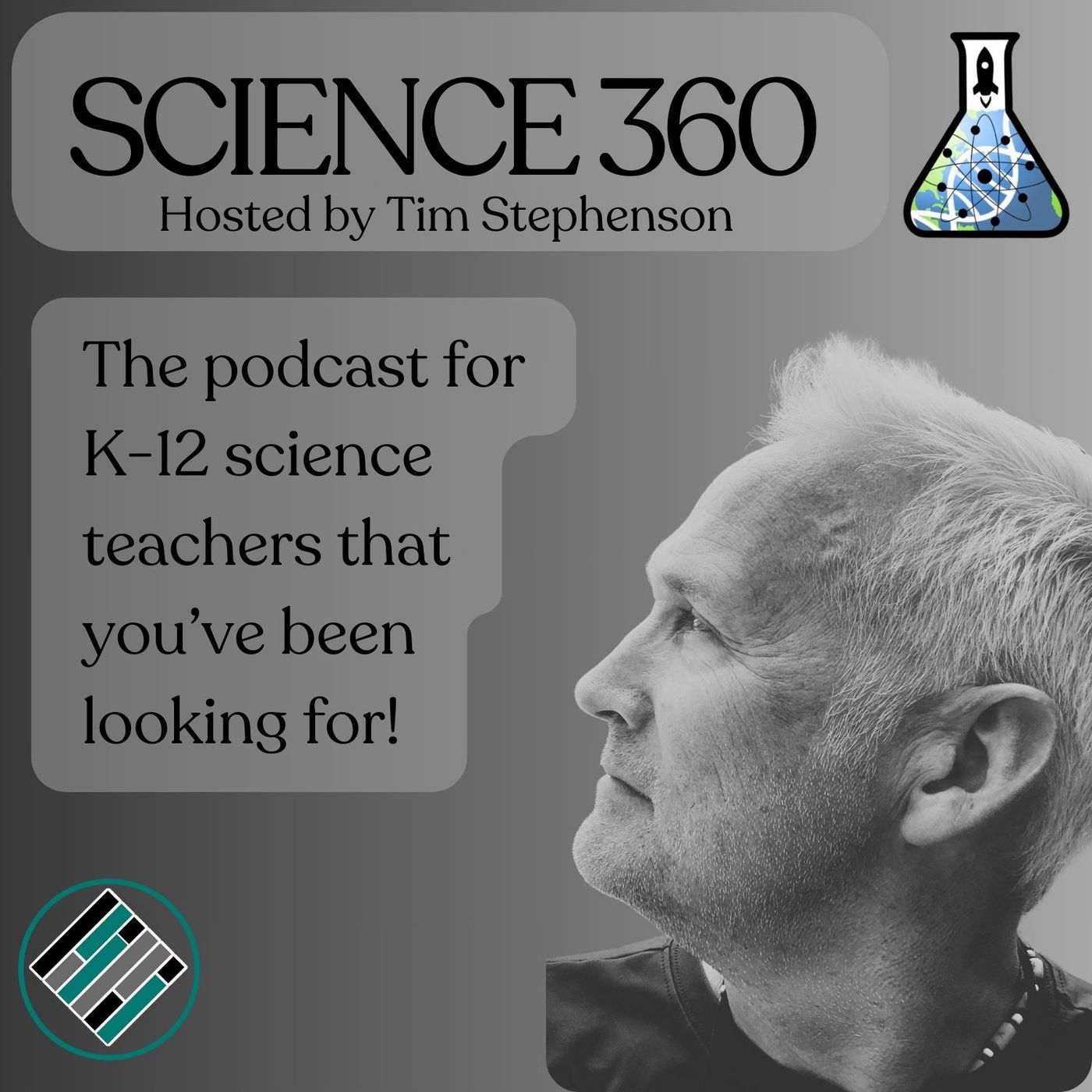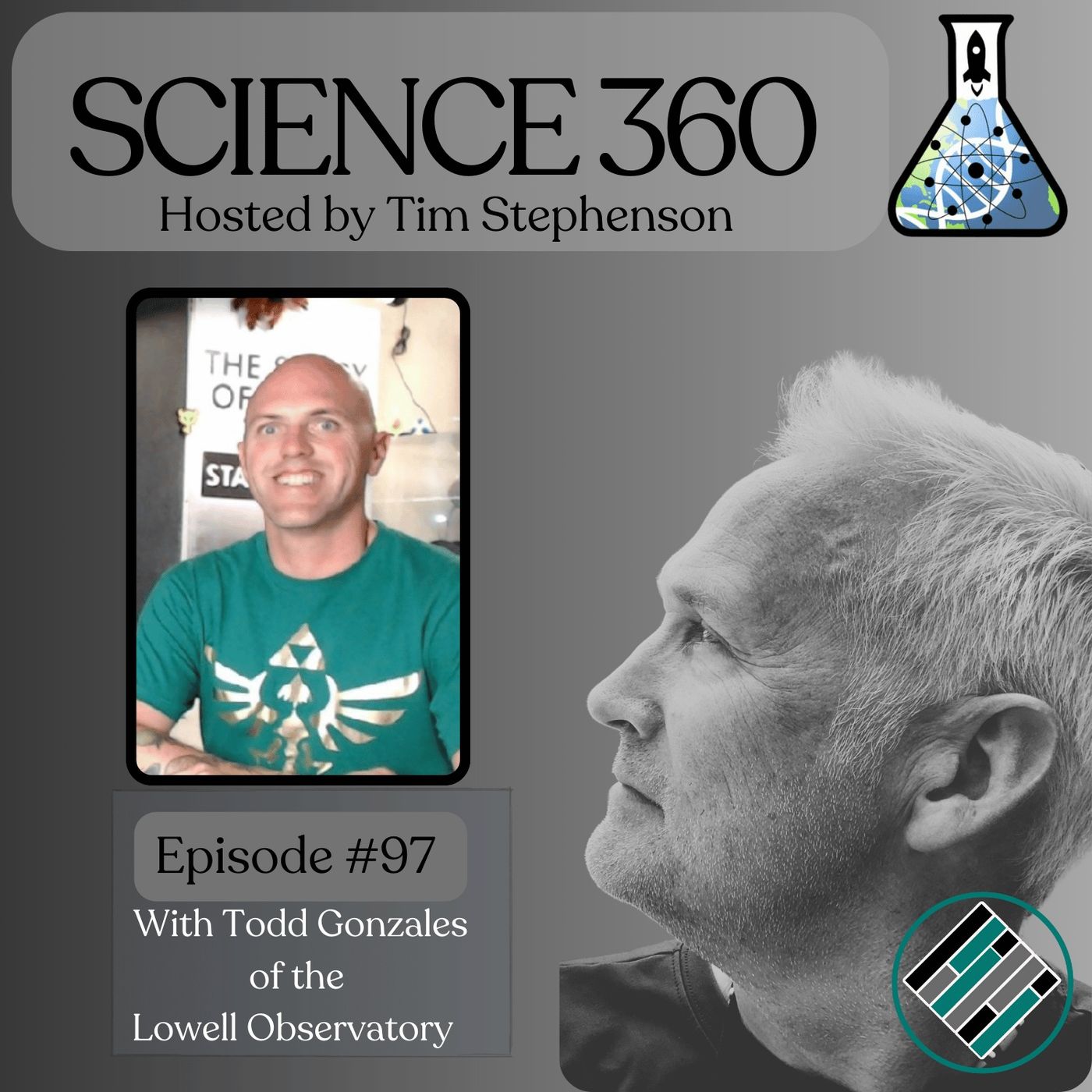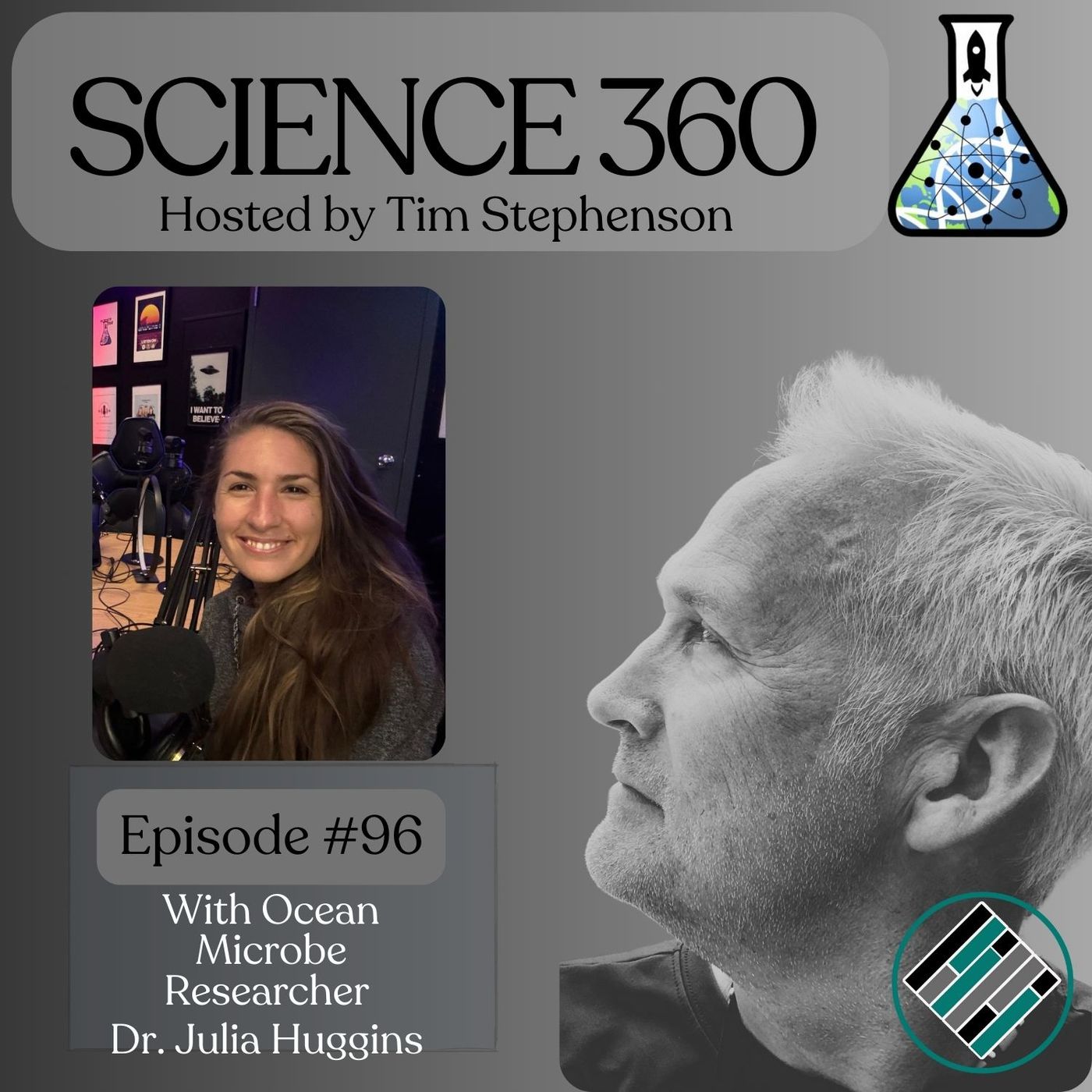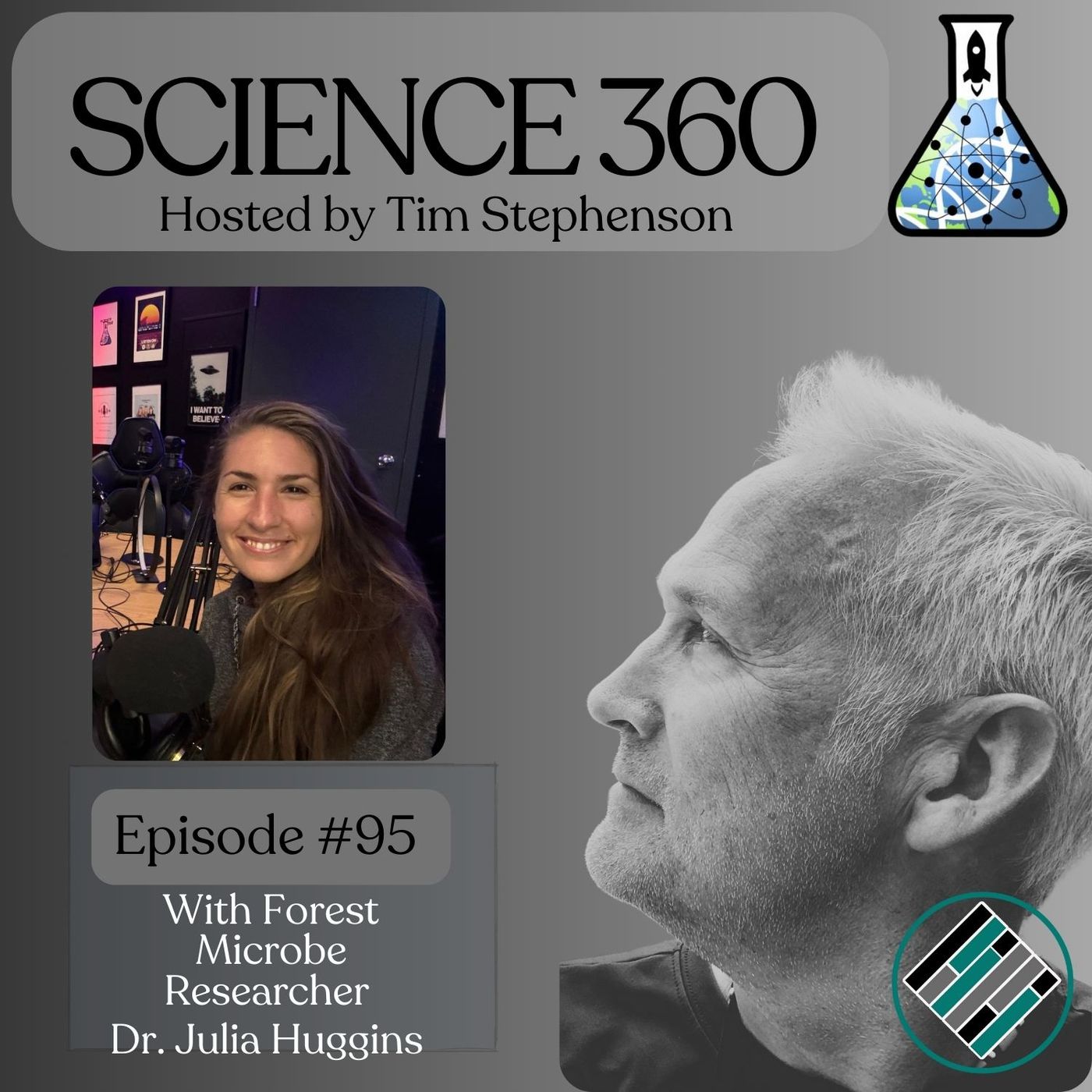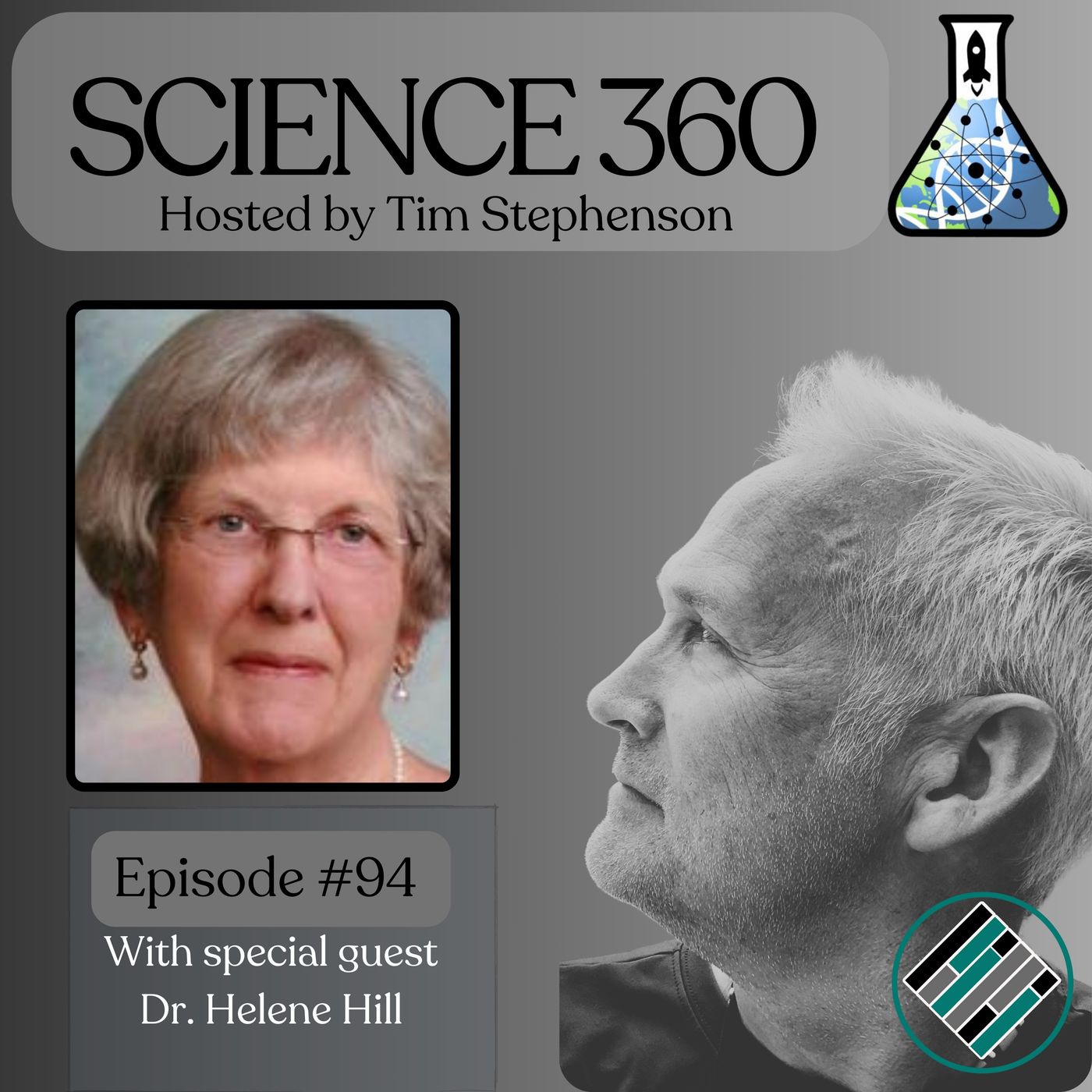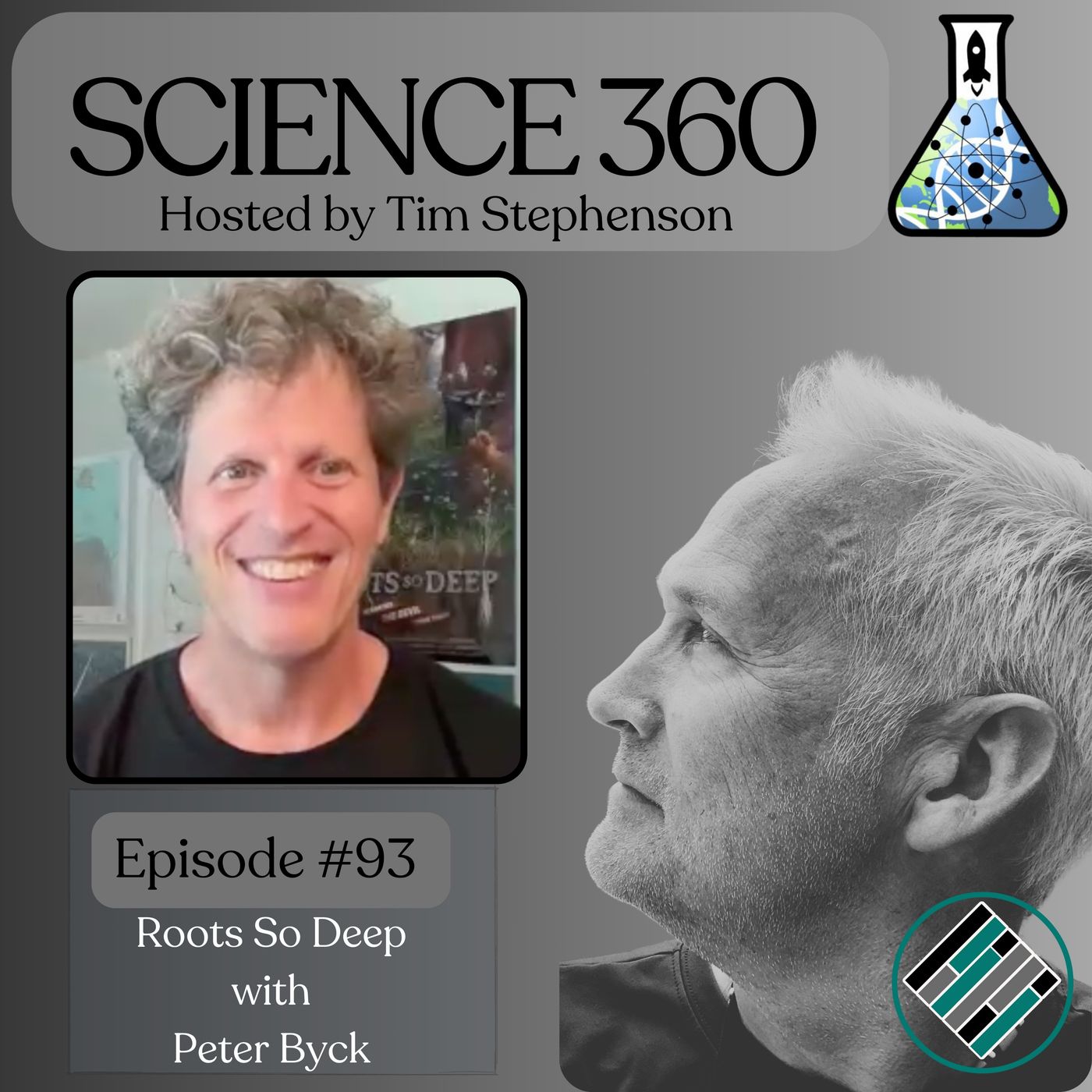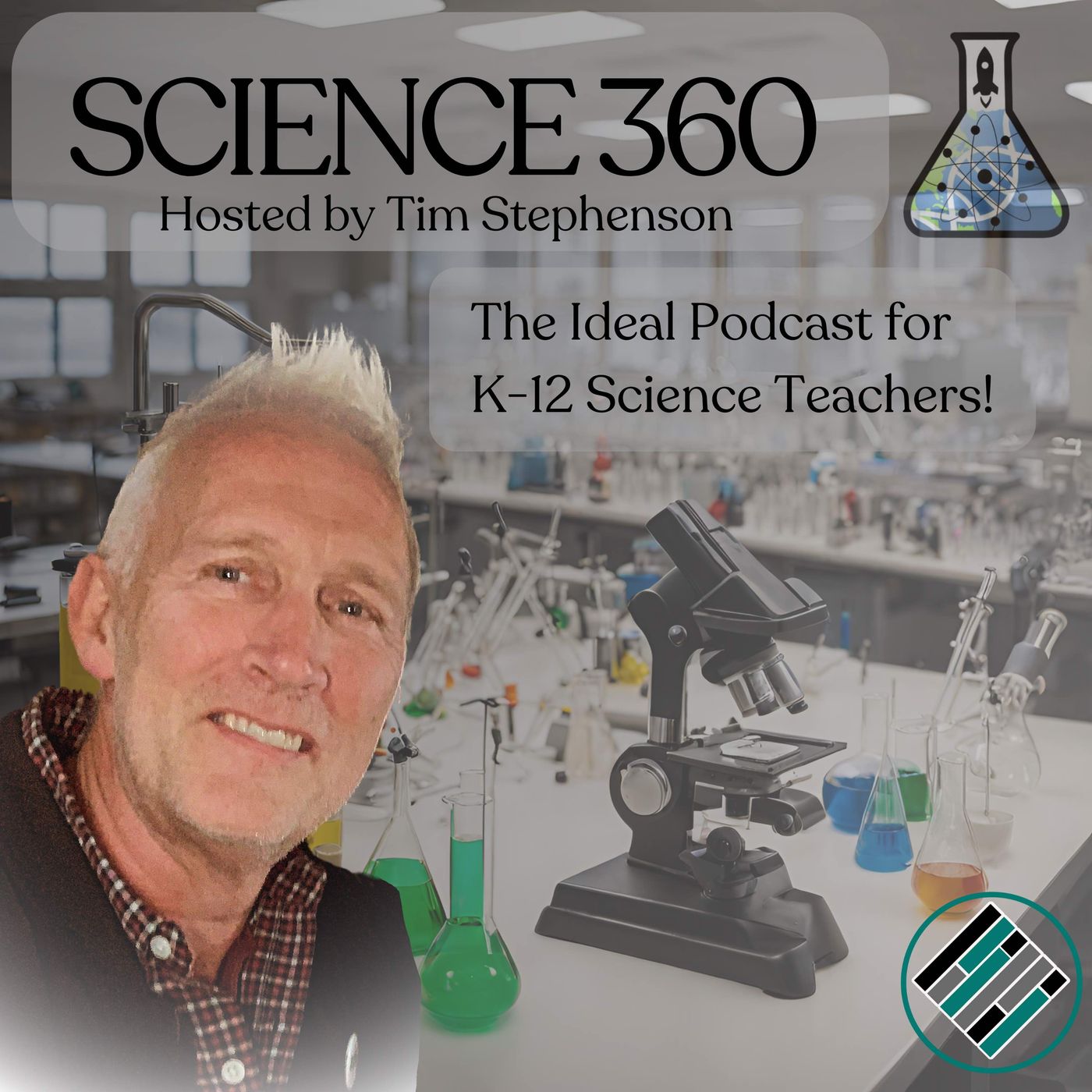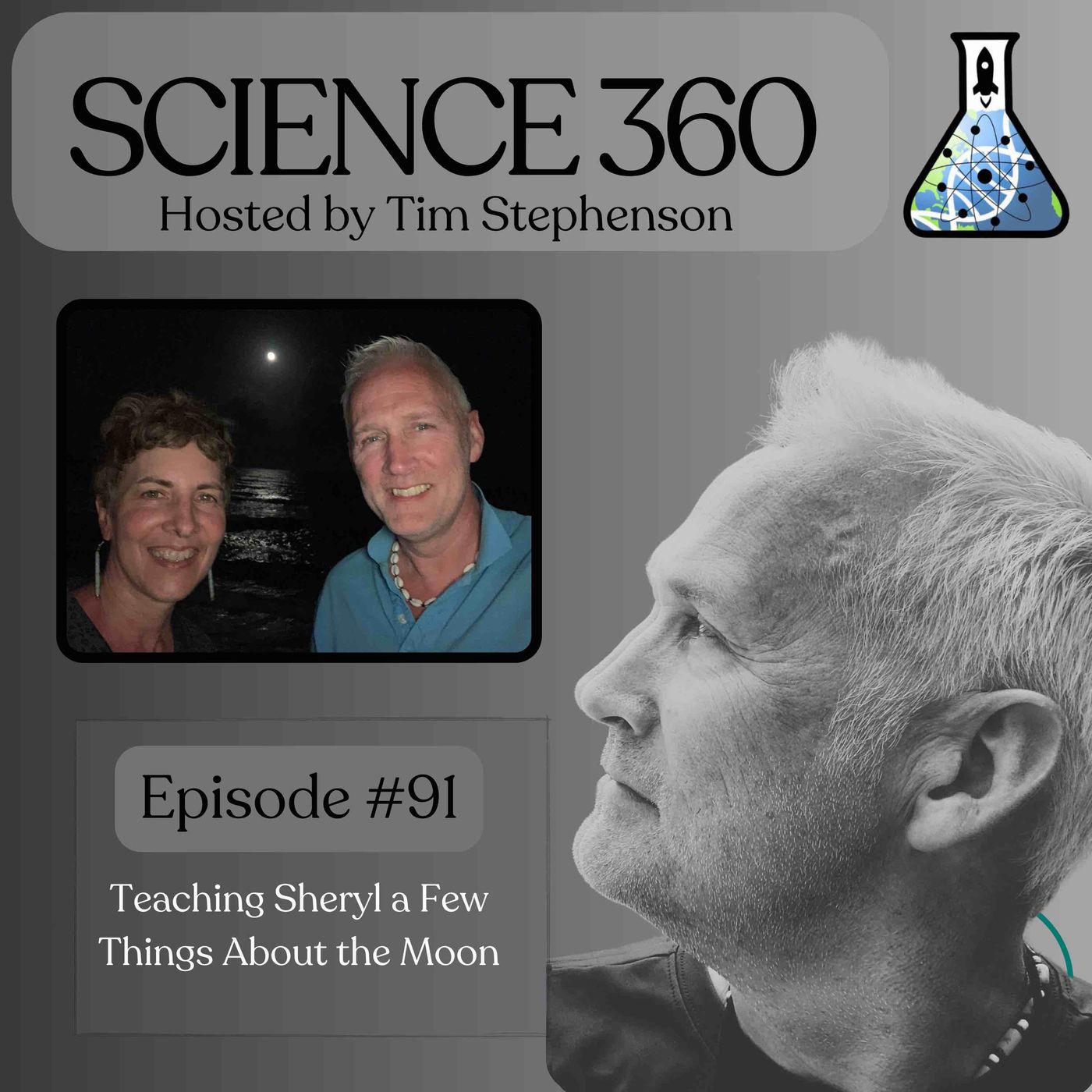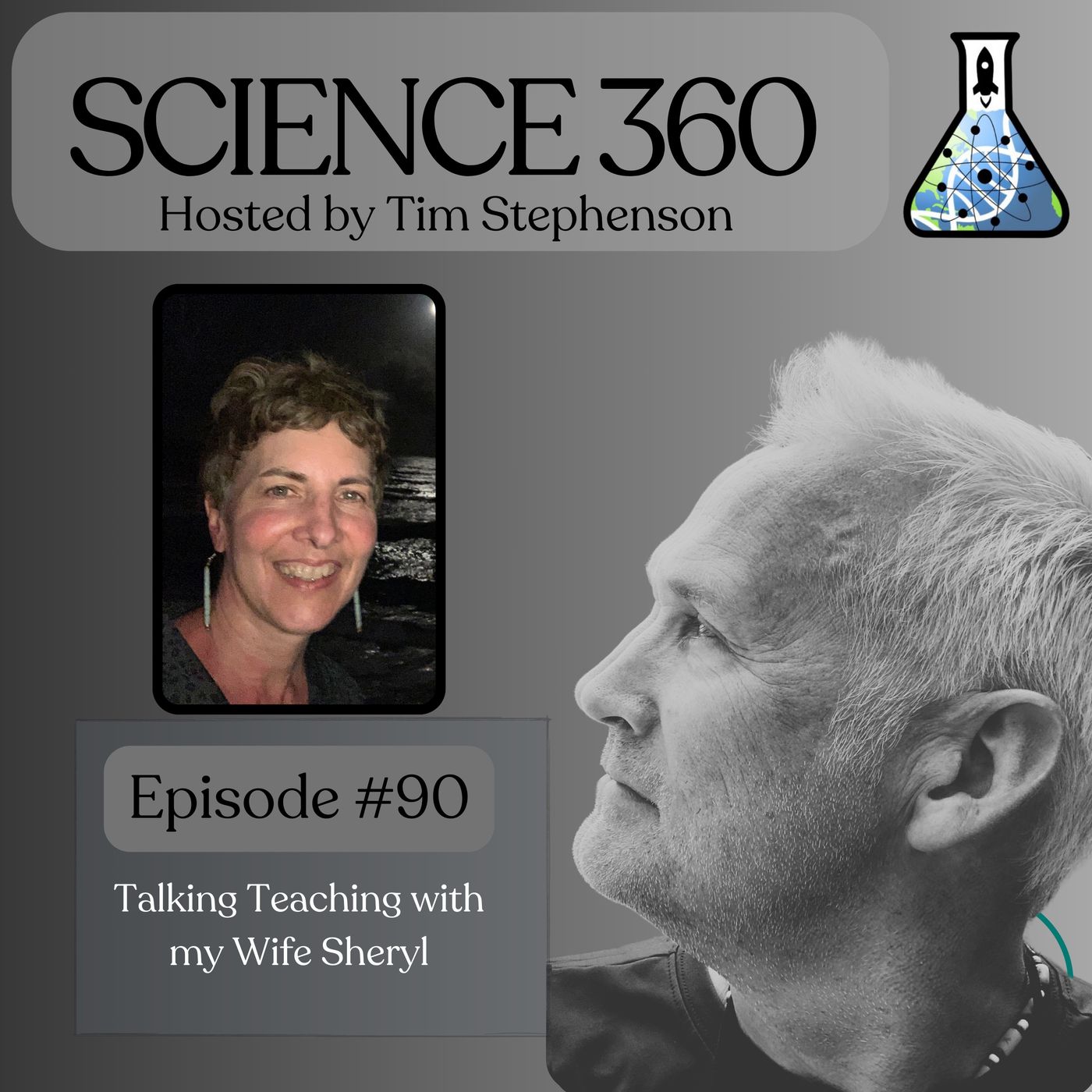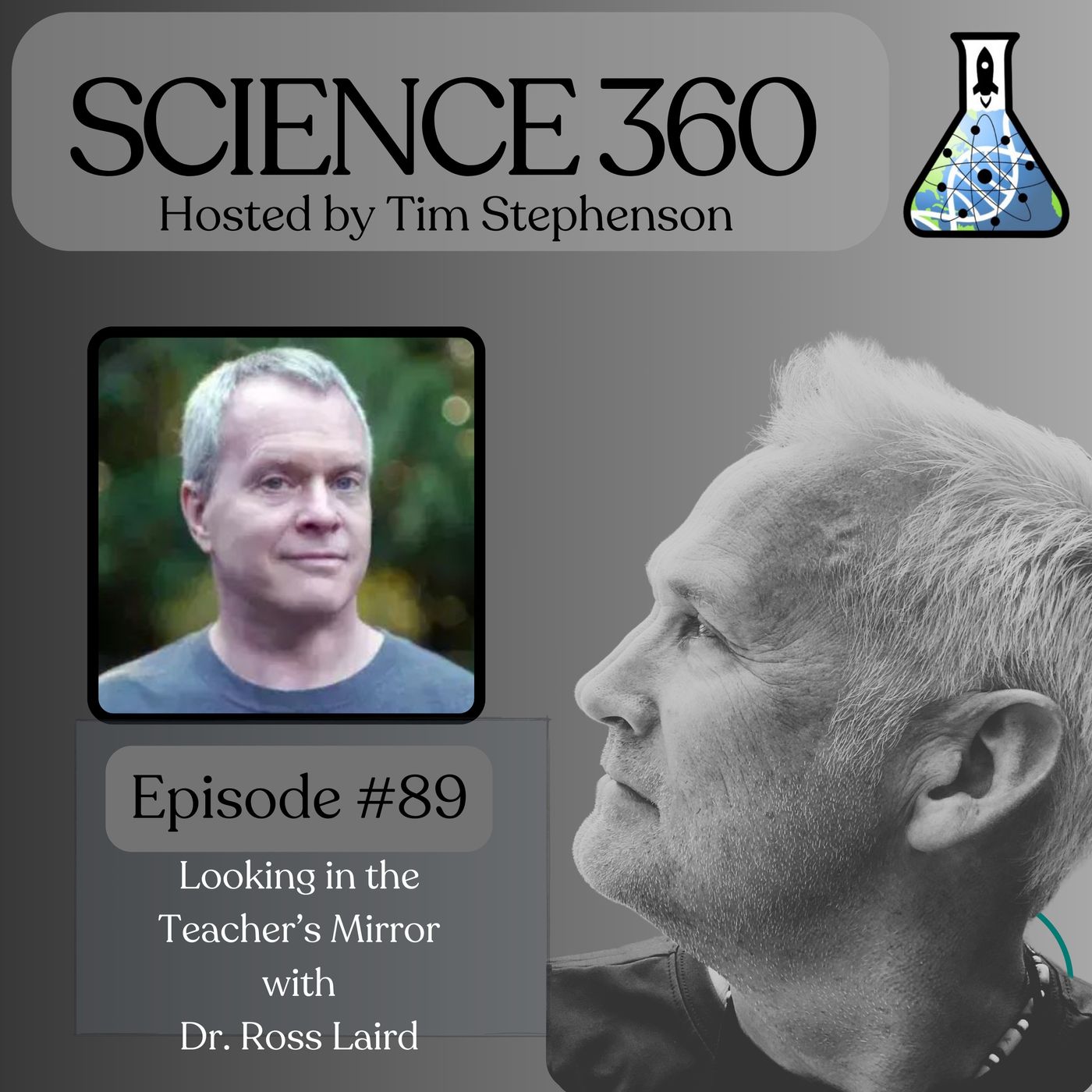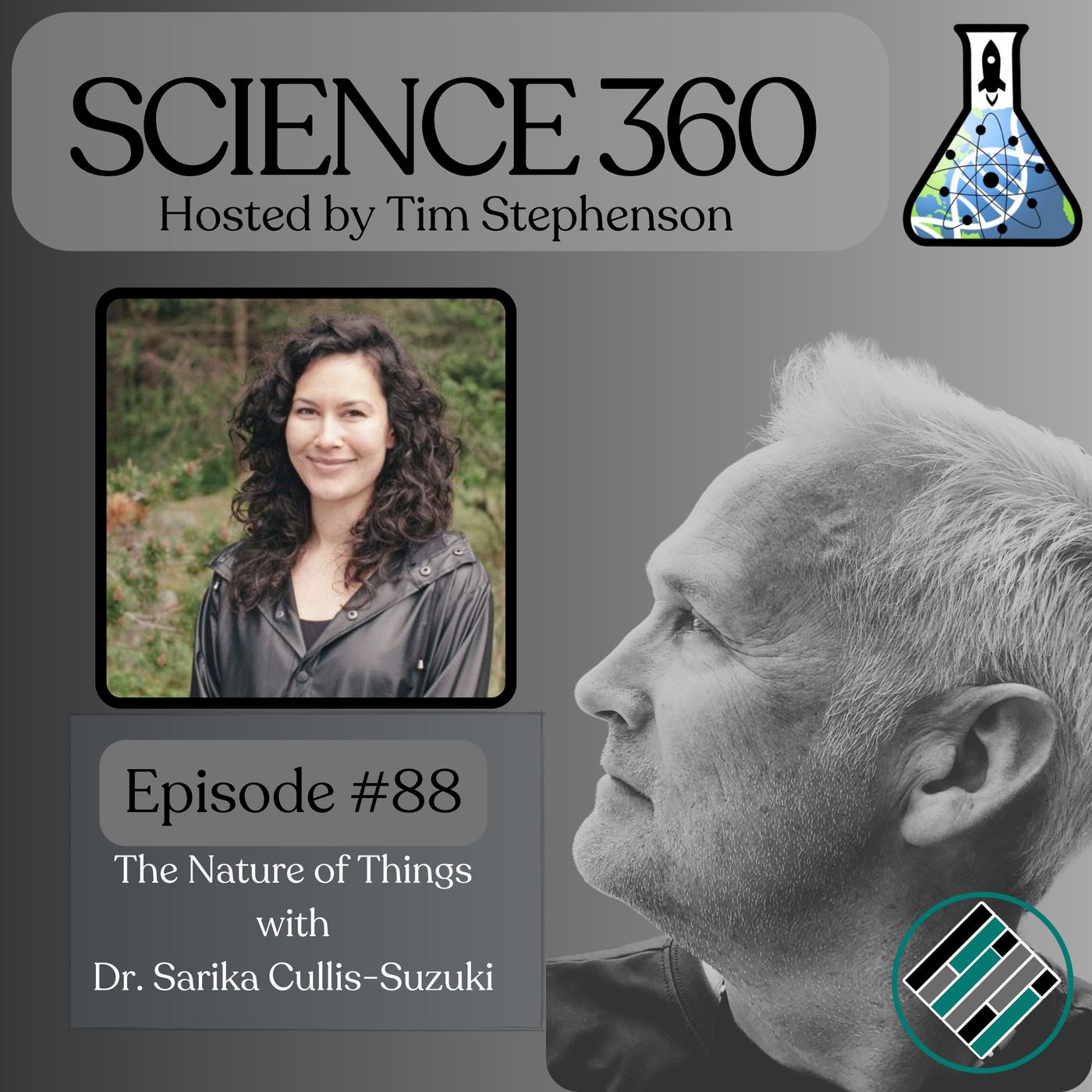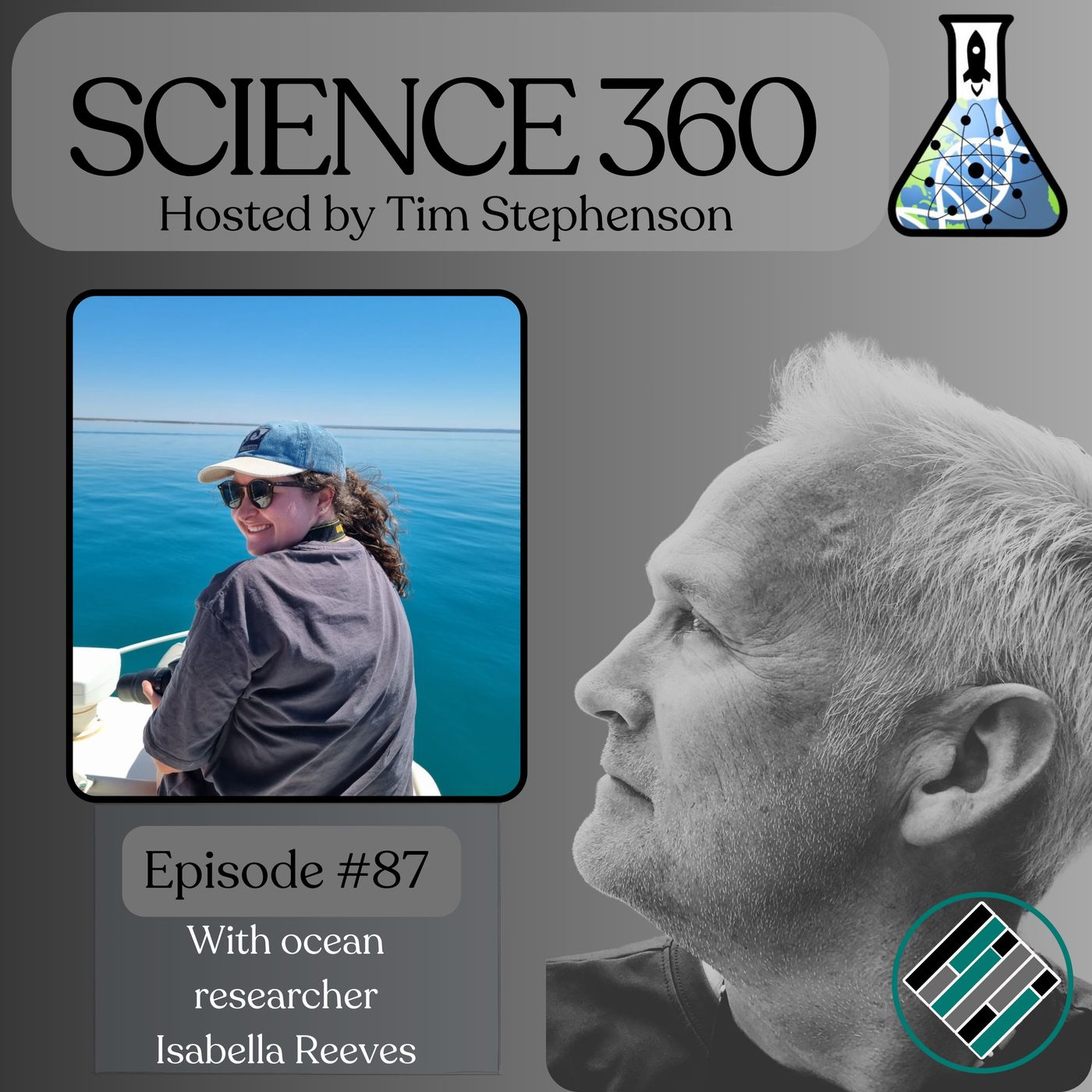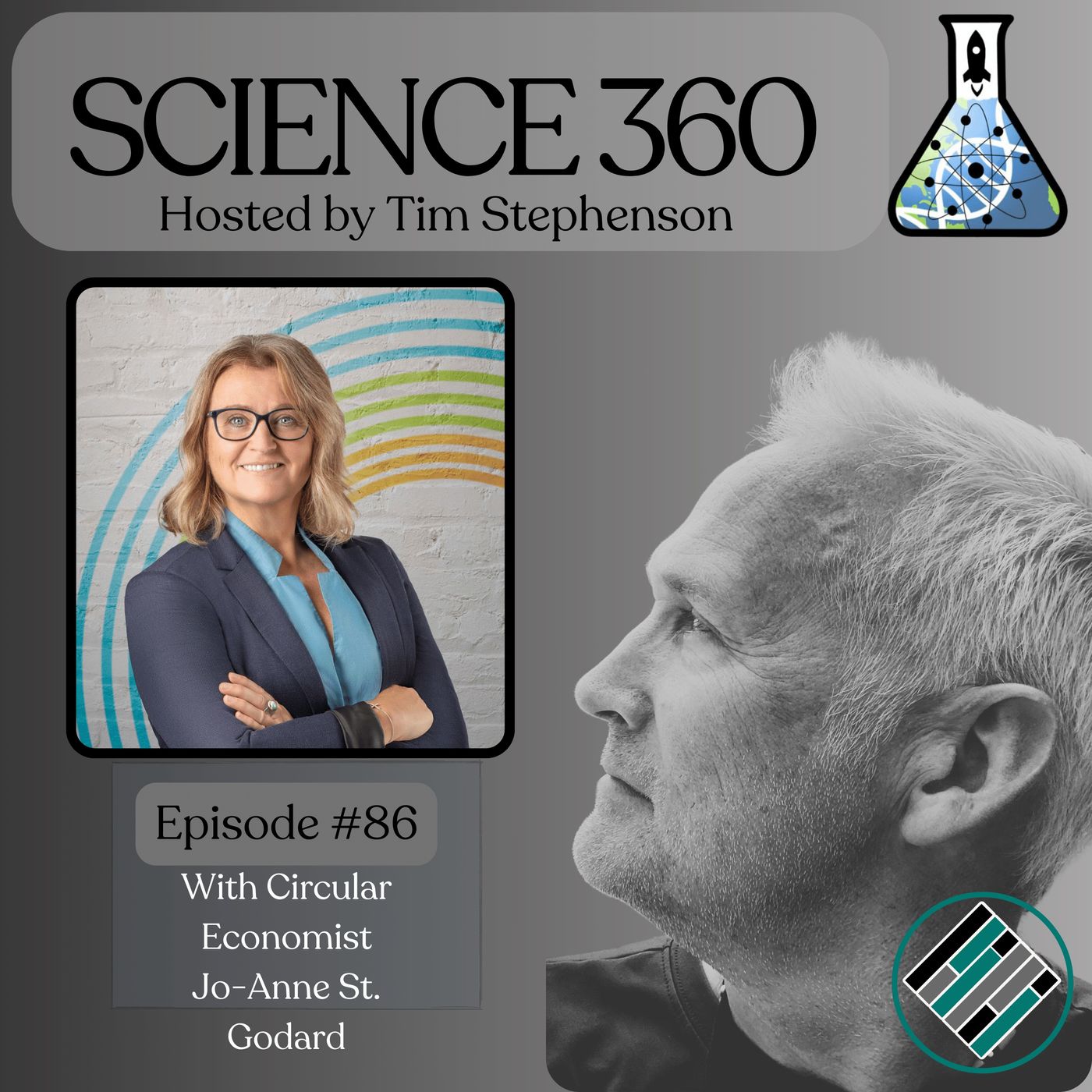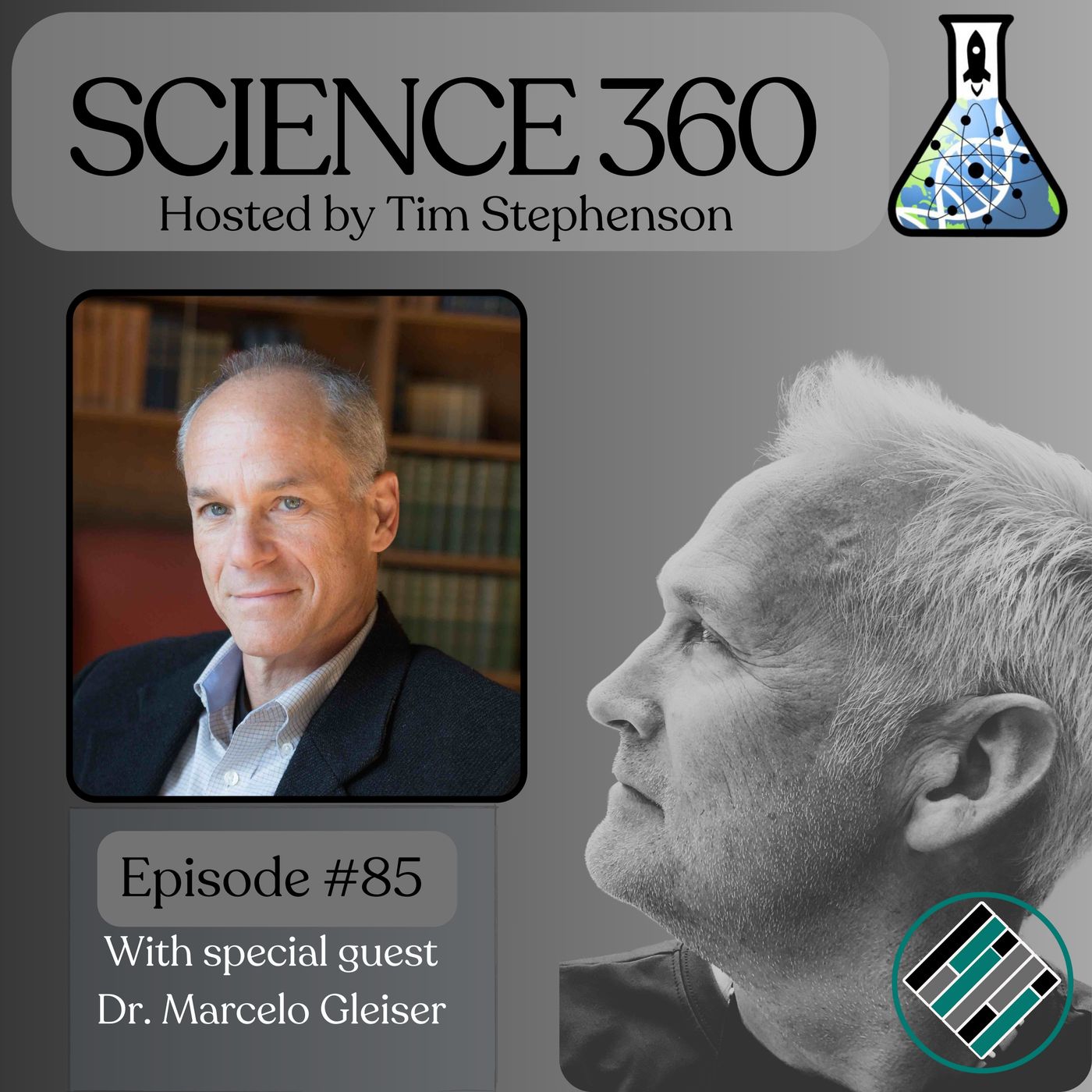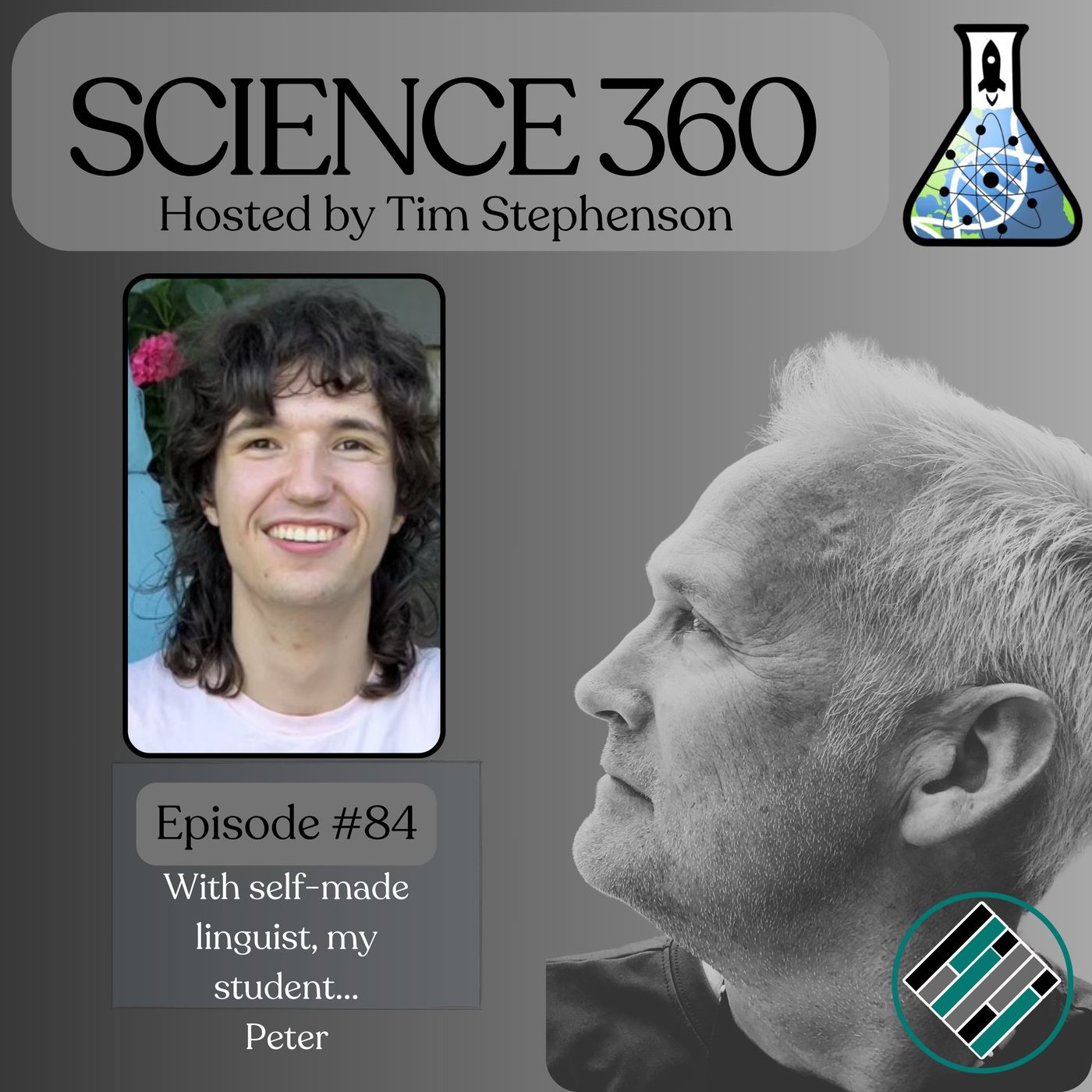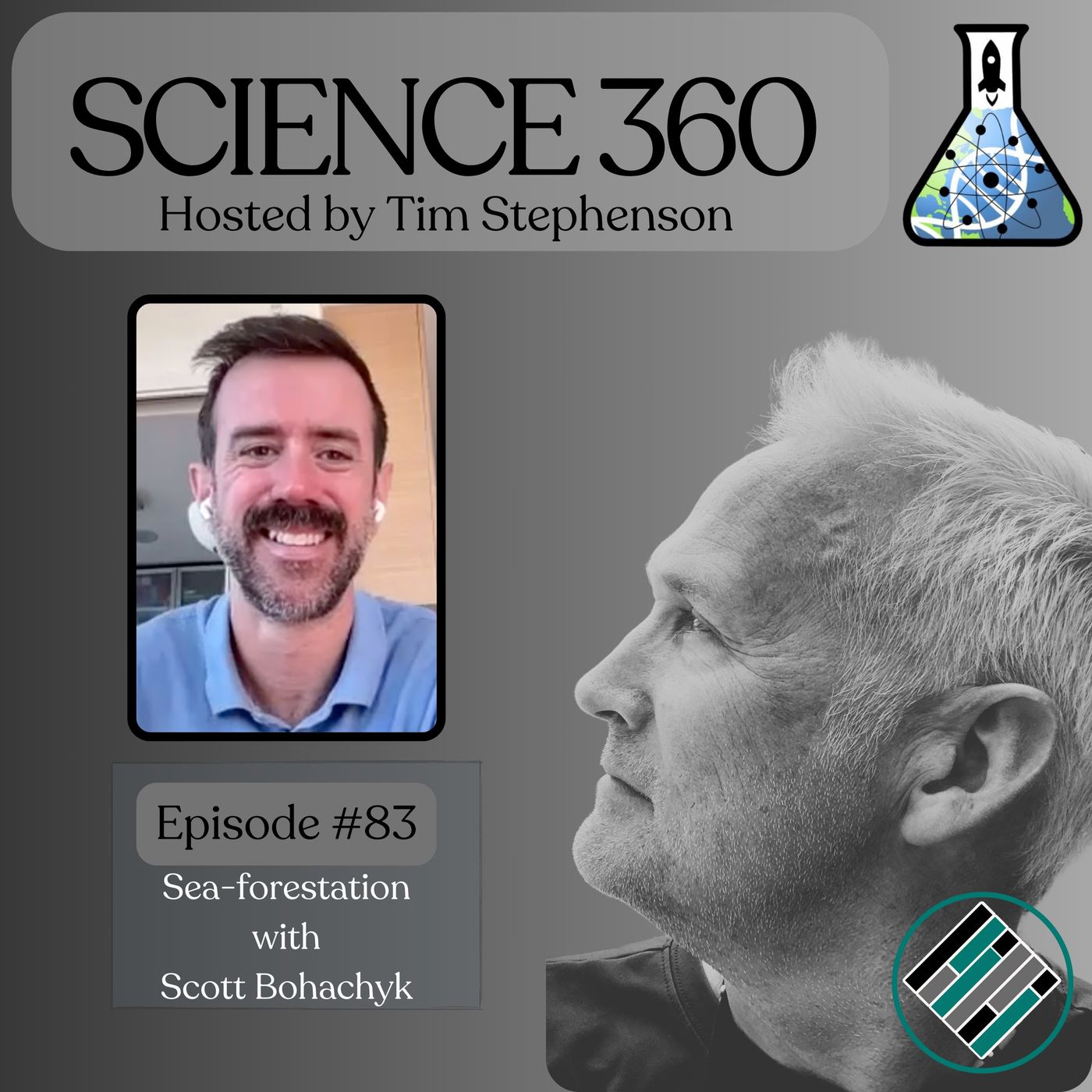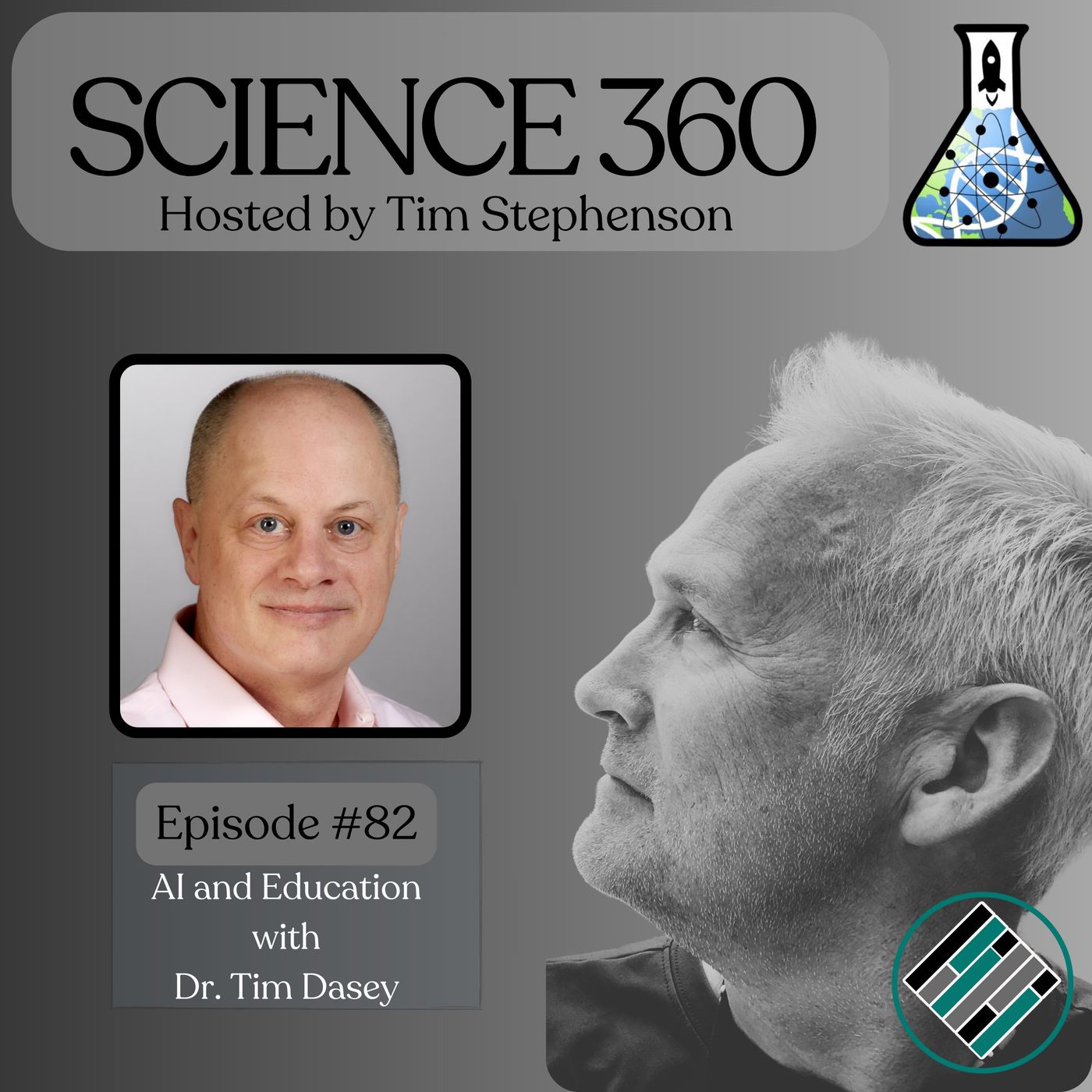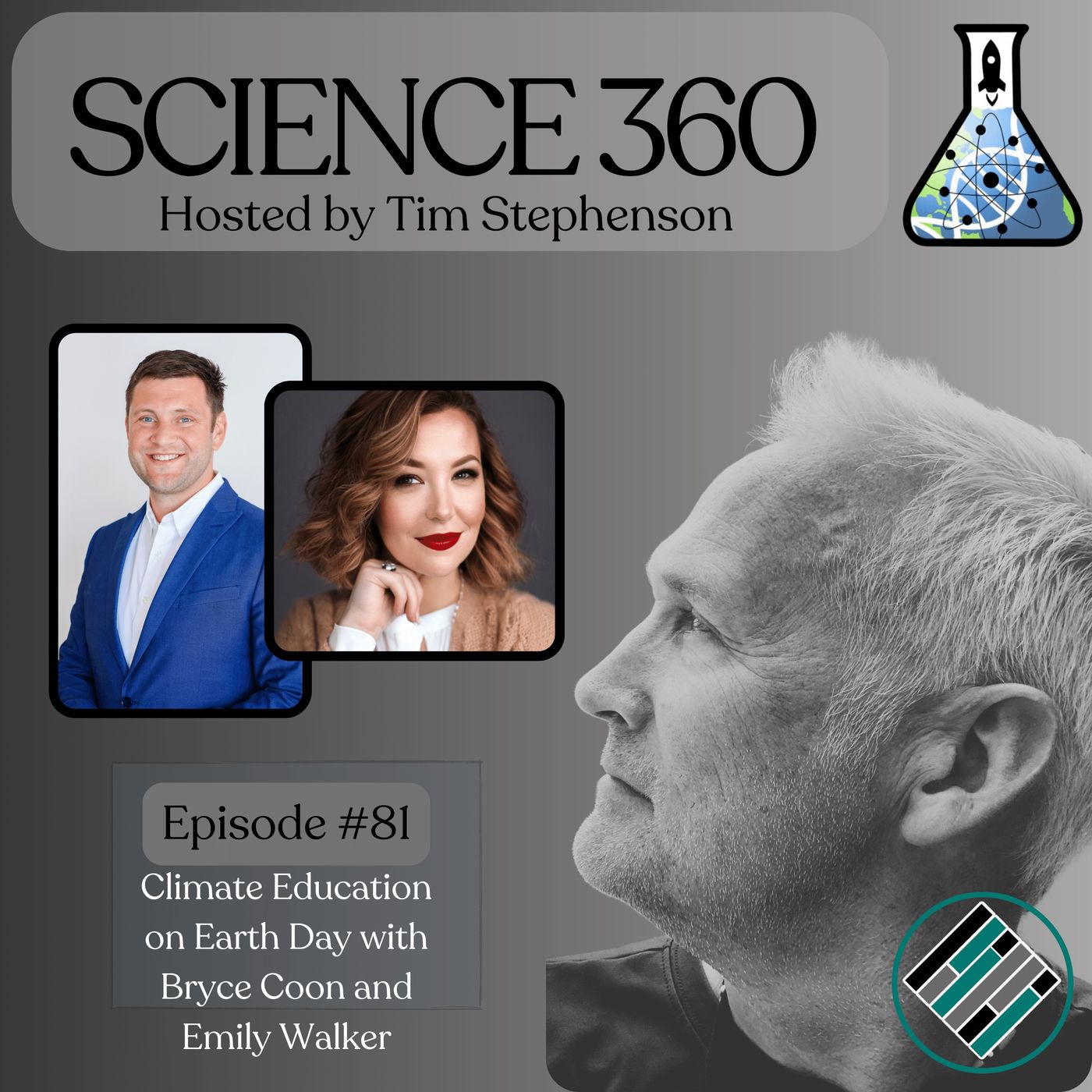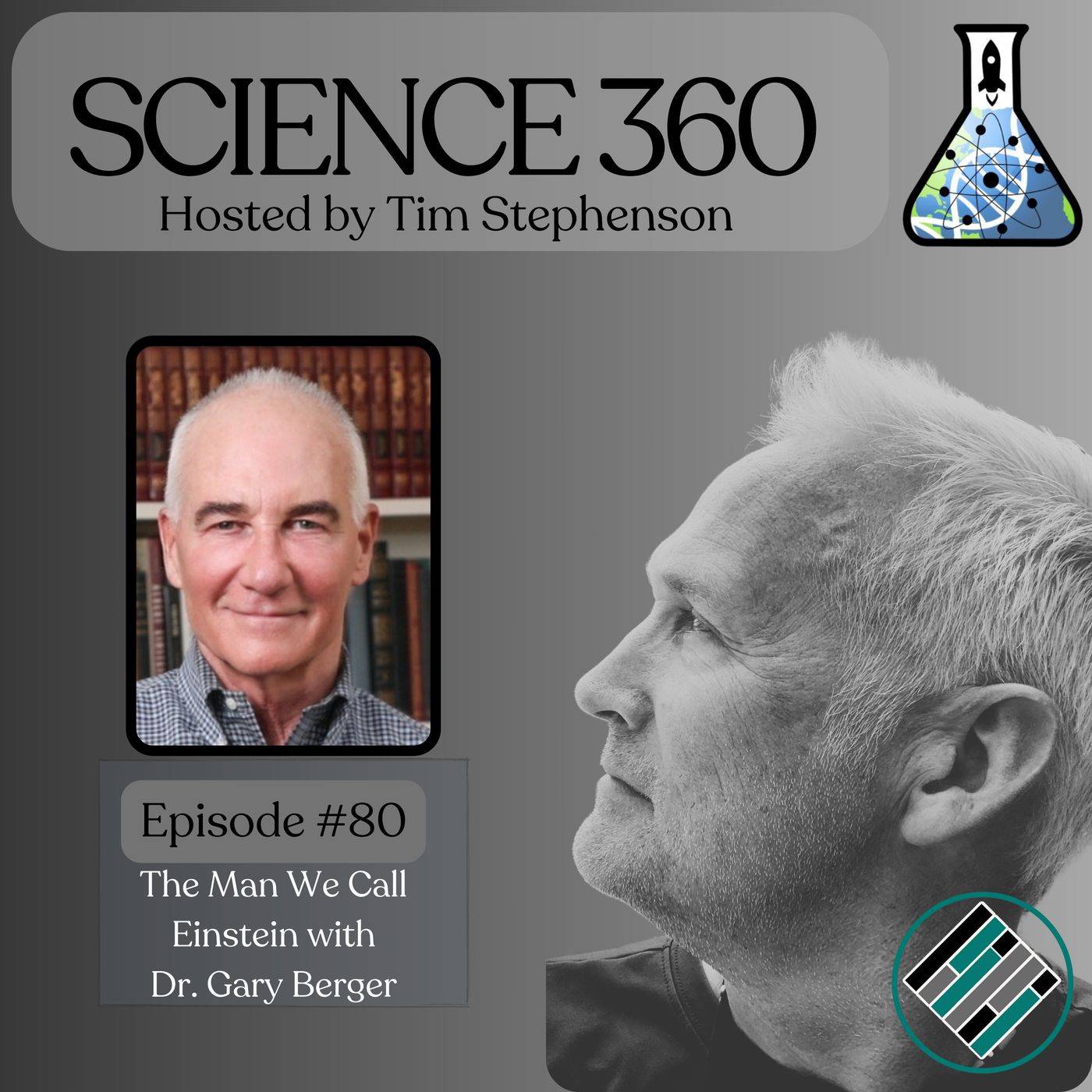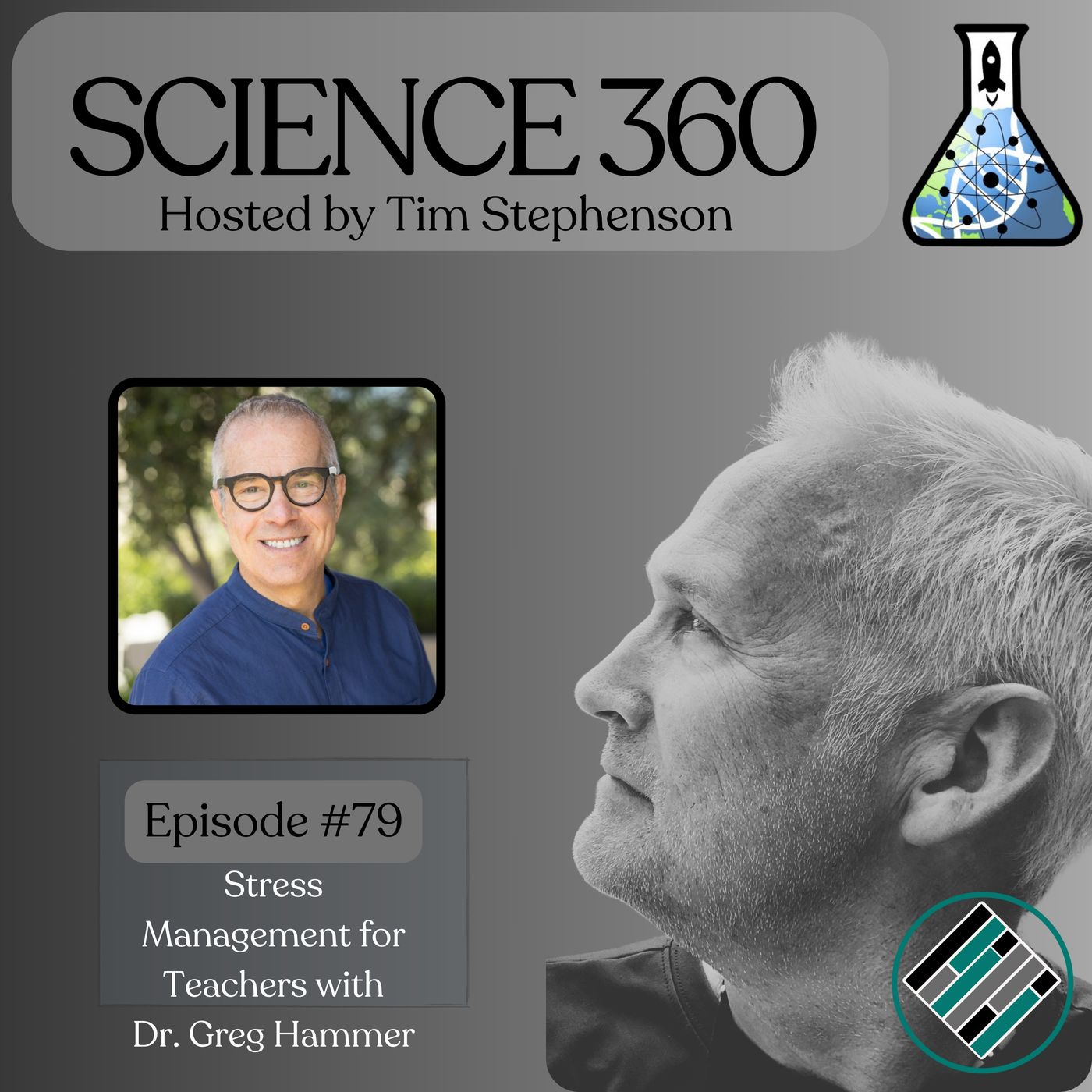Discover Science 360
Science 360

Science 360
Author: Tim Stephenson
Subscribed: 79Played: 1,717Subscribe
Share
© Tim Stephenson
Description
Are you a science teacher seeking inspiration for teaching? Whether it's space, the climate, chemistry, biology, physics or educational theories, Science 360 explores science from all angles, offering that spark that your K-12 science classes may need. This is where you can listen, learn and then feel empowered to teach awesome lessons! Join me and my amazing guests each week and let their knowledge become your knowledge and ultimately, your students' knowledge.
98 Episodes
Reverse
That's a wrap for season 5 on Science 360. I'm sharing with you today some highlights from 7 of the 19 episodes of the season. Of course, there could have been many more, but I had to consider time limitations. Plus, this forces you to click on these episodes and all the others to hear more!Today you will hear from:Dr. Greg Hammer, MD, a mindfulness expert who talks about modulating the effects of the vagus nerve on your parasympathetic nervous system. Do you get stressed? Listen to Dr. Hammer!Dr. Tim Dasey, an expert on AI and author of the book Wisdom Factories. Have you wondered about how AI will factor into your world? Check out my episode with Tim and find him on LinkedIn as well for lots of blogs on AI and education.Mr. Peter Phillips-Johnston, a former student of mine who has become an expert in linguistics. Peter talks about how learning anything is possible, with the right mindset.Dr. Marcelo Gleiser, Templeton Prize Winner. Dr. Gleiser is a deep thinker on all things science and philosophy, an intellectual who emphasizes the need for creativity and art.Dr. Ross Laird, a professor who promotes a mindful change in the education system. Ross will push the way you consider the traditional classroom.Dr. Sarika Cullis-Suzuki, the host of CBC's The Nature of Things. You might recognize her name, but Sarika brings all the knowledge and enthusiasm for learning science as her father did.Dr. Julia Huggins, an expert on the microscopic world of microbes, the very thing that sustains all life on the planet! Julia was so interesting, I had her on for a two-part series!
Hello, and welcome to another episode of "Science 360" the podcast where we explore the wonders of the universe, all aspects of science (360 degrees...full circle...get it?) and the brilliant minds that bring them to light. I'm your host, Tim Stephenson, and today I have a very special guest joining us from the Lowell Observatory in Flagstaff, Arizona. Our guest today is Todd Gonzales, the Director of Education at the observatory. Todd is here to share with us the rich history and groundbreaking discoveries made at Lowell Observatory. We'll delve into the story of Percival Lowell, the visionary who founded the observatory, driven by his fascination with Mars and his desire to determine if there was any life there.We'll also discuss the construction and significance of the iconic Clarke Telescope, and the fascinating tales of how Uranus, Neptune, and Pluto were discovered.Additionally, we'll touch on the incredible contributions of Vesto Slipher, whose work provided the first evidence that our universe is expanding.For any teachers tuning in, get ready for a wealth of information about our solar system that you can bring back to your classrooms. So, without further ado, let's welcome Todd Gonzales to the show.
Dr. Julia Huggins Part 2In this episode, we welcome back Dr. Julia Huggins to dive into the world of ocean microbes and their critical role in our planet's health. Dr. Huggins shares her research on how ocean warming, acidification, and deoxygenation are impacting these essential microorganisms. She explains that maintaining healthy ocean circulation is crucial for balancing microbes, nutrients, and energy, which in turn affects global weather patterns and climate stability.Dr. Huggins delves into the consequences of disrupted oceanic conditions, highlighting how changes in temperature, pH levels, and oxygen availability can lead to significant shifts in microbial populations. These shifts can have cascading effects on marine ecosystems, from the smallest plankton to the largest marine mammals. By understanding these connections, we can better appreciate the importance of preserving ocean health in the face of climate change.Additionally, Dr. Huggins emphasizes the need for robust scientific research and global cooperation to mitigate these issues. She discusses potential strategies for protecting ocean circulation and maintaining microbial balance, ensuring a sustainable future for our oceans and, by extension, our planet. This episode offers valuable insights into the intricate web of life beneath the waves and underscores the urgent need to address environmental challenges affecting our seas.Please rate, review and share this episode and this podcast with your friends and colleagues.
This is part 1 of a 2-part series with Dr. Julia Huggins. In this episode, I sit down with Julia, a recent PhD graduate in biogeochemistry, to explore the fascinating world of forest microbes. Julia explains how these microscopic organisms create intricate networks that connect plants and trees, playing a crucial role in the ecosystem.She emphasizes that understanding these connections can serve as a valuable lesson for junior science students, illustrating the interconnectedness of all life forms and the foundational role microbes play in nature.Julia also shares her educational journey, recounting her path from high school through undergraduate studies and eventually to her PhD. Her story is one of determination and curiosity, as she carved out her unique path in the field of biogeochemistry. Her passion for microbes developed over time, and she now sees them as the cornerstone of natural processes, highlighting their importance not just in forests but in the broader context of environmental and biological sciences.Joining the discussion is Chris Janzen, our school librarian, who helps set the stage for the episode by discussing the educational value of long-form podcasts for teachers. Chris points out that such in-depth discussions can provide teachers with a rich resource for enhancing their curriculum and engaging students with real-world scientific concepts.This episode not only delves into the science of microbes but also offers insights into how educators can utilize podcasts as a dynamic tool for learning and inspiration.Please take the time to rate, review and share this podcast with your friends and colleagues
Dr. Helene Hill was a research scientist who did excellent work. What was working against her though was that she was doing her work at a time when men dominated the field and discriminated against women.Now at the age of 95 and working on writing her second book, Dr. Hill plans to release her memoir titled The Crying Window, to tell her story of purpose and persistence in the face of prejudice. Already a published author, Helene released a book (available on Amazon) titled Hidden Data: The Blind Eye of Science, telling the story of becoming a whistle-blower when she noticed falsified data in government-funded researchThis is a story that can inspire women in science to stay the course, and a wake-up call to men to recognize the significant contributions to science that women make every day.Within this conversation are stories of idealistic naivete, fond remembrance of teachers who inspired and life experiences that altered the course of Helene's career. Hers was a life of a dedicated love of science, a high sense of justice and a pursuit of truth within research. This is a reminder of the special privilege we have to listen to the wisdom that can only come from experience. And in this case, it was the experience of doing what was right in the massive face of opposition. Read more about Dr. Helene Hill's story at http://www.helenezhill.com/
Welcome to today’s episode, where we have an extraordinary guest, Peter Byck, the director of the upcoming documentary "Roots So Deep." Peter’s journey from Kentucky to California, where he attended Cal Arts for film school and spent over 15 years in the Los Angeles film industry, is nothing short of inspiring.His work took a pivotal turn after witnessing the impact of "An Inconvenient Truth," which led him to explore solutions to climate change through his documentary "Carbon Nation."Peter dives deep into the realm of regenerative agriculture in his latest project. He vividly recalls the early days of his research, where he realized that while there was significant focus on the destruction caused by conventional farming practices—like soil erosion from growing corn and the environmental toll of feedlots—no one was studying the potential of healthy, regenerative systems. This epiphany set him on a path to investigate how adaptive grazing can restore soil health rapidly, much faster than traditional methods suggest.In 2013, a series of meetings with various scientists—rangeland specialists, bird ecologists, entomologists, and microbiologists—led Peter to Arizona State University. Here, he received a grant to unite these experts in a collaborative effort to study sustainable farming practices. The enthusiasm and eagerness of these scientists to break away from their institutional silos was palpable. Their collective research laid the foundation for "Roots So Deep," which examines the profound impact of adaptive grazing on farms in the Southeastern United States.If you enjoyed this episode, please subscribe and leave us a review on your favorite podcast platform.Watch the documentary at rootssodeep.orgFollow on Instagram @carboncowboys
Recently, I've been approached by colleagues about various issues they've found or heard about. I appreciate that they come to me to see what I think. This is what a collegial workplace should look like. One came and brought up the topic of wellness through cold plunging. Another brought up concerns about how AI will affect our classes. I constantly get challenged over the debate between electric and gas-powered cars. Still, another brought up the issue of cloud seeding.I decided to share some thoughts around these topics (although I left out the cloud seeding part of the recording...maybe another time). I've always said that as teachers, we need to be ready with informed answers because we want to encourage our students to ask questions. I never want to shut down a good question nor placate it with a minimalist answer or simply tell them to go find out for themselves. I like to employ the "teach" part of my job title.So here is a brief rundown on three of these topics from my point of view. I hope you think through YOUR answer to these issues. If you have opinions or knowledge that differs from mine, please reach out at astrostephenson11@gmail.com and let's dialogue and allow me to learn from you.
My greatest desire for this podcast is to show you, the teacher, how teaching can be. In its purest sense and in the light of First People's Principles of Learning, there is generally one in the room who is about to lead a discussion on a particular topic. But it is not shared without great respect for the ones listening, offering up the opportunity to differ, interpret, analyze and question.And when it comes to space, inevitably there will be questions asked that you don't know the answer to. But every time this happens, allow it to add to your knowledge bank so that if it comes up again in the future, you're ready.So this may be a discussion about the Moon, but it is more than that. It is as teaching should be: multiple people involved in a respectable conversation, delving deeper and deeper into a topic. I hope you notice and can think of ways that this conversation could lead into activities of inquiry, presentation by the students, group-lead gallery walks involving art and science and history, filled with opportunities to express a newfound and, indeed, profound understanding of this heavenly body we call the Moon. Where could your lesson go next? What planet or star or galaxy do you want to learn about to lead further lessons and explorations of space? If you allow the teacher mind to go wild, the possibilities are endless.
Here are two new twists...firstly, I'm the one getting interviewed on this episode, and secondly, it's my wife asking the questions!Yes, I invited Sheryl to turn the mic on me after I was inspired to do so when my guest from episode 88 said she was curious about why I got into teaching. That was Marika Cullis-Suzuki so be sure to check that episode out.This episode is a bit of an experiment. I hypothesize that behind every great podcaster is an even greater spouse. I'd love to do this sort of episode regularly. I'm not oblivious to the fact that there have been many times when I thought I was saying something intelligent, only to have Sheryl shed so much more light on it! I guess we all need someone in our lives to point out that we don't know it all. Please connect with me to let me know if you want Sheryl to come on with me regularly. You can email me and give me some feedback on this:astrostephenson11@gmail.comAs usual, please rate, review and subscribe on Apple or Spotify to help with the algorithms.
What if teaching was less about tradition and more about breaking the rules? What if teaching put less emphasis on predetermined learning outcomes and standardized tests and more emphasis on discovery and inquiry?What you would have would be an educational system that inspires, that evokes meaning and puts the learner first, even over the dusty lesson plans that would have fit right in if they were delivered 20 years ago.This is the mind of Dr. Ross Laird, a post-secondary educator, an educational consultant and a progressive thinker who forges ahead with the right kind of change, even in the face of resistance from the mainstream institution of school. A man after my own heart.Ross was preaching to the choir in this conversation. And I hope you'll join us for the next chorus, because as I like to say, teaching really can be this way.But let's let Ross explain. He speaks so well and his evidence-based points are so well made.Please find more of his work at https://www.rosslaird.com where you will find his blogs, articles and his Tedx talk.I'm also going to link to my book "Beyond the Classroom". We talk about the section of the book where I wrote about Ross after his visit to my school over 15 years ago.You can get in touch with Ross and have him come to your school for a brilliant pro-d if you email him at ross@rosslaird.comBe sure to check out more episodes of Science 360 such as my discussion with Dr. Marika Cullis-Suzuki where we discuss the intrinsic value of scientific knowledge and how important it is to inspire our students with the wonder of nature. Or how about a discussion about AI with Dr. Tim Dasey. There are lots of conversations that will amplify what you do at school and in your science classroom.Please rate and review and subscribe on your favourite podcasting platform.
What an exhilarating experience hosting Dr. Sarika Cullis-Suzuki, the host of The Nature of Things, the world's longest-running science show for over 60 years!A cornerstone in science communication, it's now entering a new era on the CBC Gem app, offering modern content to enhance your science lessons. Make sure to explore the show for a fresh perspective that can invigorate your science curriculum.Sarika, a passionate science communicator and planet advocate, stresses the vital role of educators, emphasizing our impact on climate awareness. Together, we affirm that education is paramount, but action starts today.Infuse knowledge, hope, and action into your science classes, drawing inspiration from Sarika's infectious energy. This episode will reignite your excitement for the classroom, fueling your dedication to teaching science.Tune in and let's collectively drive change in science education!
Dive deep into the oceanic realms as Science 360 brings you this riveting episode. Join me, Tim Stephenson in an engaging conversation with Dr. Isabella Reeves, a pioneering researcher delving into the genetic fabric of orcas.Discover how her groundbreaking analysis links orca pods worldwide to a common ancestry, unveiling the intricate history of these marine dynasties. Hear the story of Old Tom, an orca that assisted whalers 100 years ago.This episode is your backstage pass to the fascinating world of orca genetics and how it connects to your classroom. Get ready for a whale of a time as science takes center stage. Connect with Isabella at the Cetacean Research Centre, Southern Shark Ecology Group, College of Science & Engineering, Flinders University, Australia.X: @bellaa_reevesLinkedIn: Isabella ReevesEmail: isabella.reeves@flinders.edu.au
Jo-Anne St. Godard has had a circular economy mindset for decades. A simple Google search and you will see that Jo-Anne has been advocating for an economy that relies less on extraction and new goods from raw materials, and moreso on repurposing existing materials into a second, third and fourth life. A regular guest on news reports, a speaker at conferences and lobbying the government for a more responsible, lower carbon emitting, circular economy.Now as the Executive Director of the Circular Innovation Council of Canada, Jo-Anne is one of Canada's leaders in the shift away from consumerism, and is a strong advocate for adding value to what has traditionally been "thrown away". If you listen to enough of my episodes, you will know by now that I am right there with Jo-Anne. There is no "away", the planet cannot continue to be humanity's garbage can and the oceans our toilet. There are enough materials already made that with some planning and foresight, we can cut down on our selfish use of Earth's resources and make use of what we already have. I also beleive that the path forward in all of this is education. I'm a teacher and quite possibly you are too. I use my platform to raise awareness and instill a "stop and think" approach to the behaviours of extract, manufacture, transport, use, break, toss and repeat. The solution to all of this is educating the young people and empowerin them with the opportunity to imagine and create the future that they want to grow up in.Please follow the work of Jo-Anne St. Godard via the website:https://circularinnovation.ca
This is a wide-ranging conversation covering topics such as Newtonian physics, the Copernican revolution, life in space, genetics, the interconnectedness of life and teaching. It kept coming back to teaching and the type of education we should be bringing to the classroom.This conversation can affect the way you teach. It can refocus you on a modern approach to education and dare I say, what really matters. And, what really matters first and foremost is our relationships with the students, followed by our relationships with the curriculum, and getting to the heart of learning through stories that connect the brain to the heart…and it’s in that place that lasting learning takes place. It's there that students begin to learn, not because they have to but because they want to. It was a pleasure and a privilege to speak with Dr. Gleiser. Be sure to check out all these links to his website and publications and socials and also to his latest book, which will soon be in my school’s library.Website: https://marcelogleiser.comYouTube: https://youtube.com/playlist?list=PL3fqH16afbPKHx7ABOyQ0soOWyy0RlUOP&si=l5nfcWPscnzHajJjTwitter: @MGleiserInstagram: @GleiserofficialBlog series: https://bigthink.com/13-8/Templeton page: https://marcelogleiser.com/media-templeton-prizeTempleton prize website: https://www.templetonprize.org
When my student, Peter, approached me about being a guest on my podcast, I wondered what we would talk about. However, I'm glad we recorded because what we have here is golden. Yes, a lesson in language, but more than that, a lesson in grit, passion, pursuit of knowledge and independent learning. This episode will leave you amazed at what a young person can accomplish. If you know people like Peter, be sure to give them the platform they deserve to share the wisdom that lingers just beneath the surface.
Scott is committed to advancing nature-based solutions that benefit people and the planet. His current work and experience has resulted in an inspiring and dynamic network that seeks solutions to the complex environmental challenges of our times. He work closely with various levels of government, industry, universities and non-profits to coordinate and amplify these efforts. In concert with a talented team at Ocean Wise, he designs, scales and optimizes solutions that have concrete benefits to people and the planet.Scott was selected as the North American civil society representative for the third and fourth United Nations Environment Assembly (UNEA), in Nairobi, Kenya. He also recently completed his Executive MBA at the Smith School of Business at Queen's University in early 2020.Scott is fortunate to have worked and lived across Canada and internationally over the last decade. This has provided Scott with the unique opportunity to contribute to and lead an incredible variety of teams with different values, worldviews, and skill sets. Connect with Scott via email: Scott.Bohachyk@ocean.orgOceanwise: https://ocean.orgScott’s department at Oceanwise: https://ocean.org/climate-change/seaforestation/Education resources including the SeaDome: https://ocean.org/learn-explore/education/Oceanwise for teens: https://ocean.org/learn-explore/youth-programs/youthtosea/Oceanwise for young adults: https://ocean.org/learn-explore/youth-programs/ocean-bridge/
Dr. Tim Dasey knows how to push educational buttons, and let me be clear, this is a good thing!I found this out as I recorded this episode and listened to Tim’s theories on how schools need to evolve. These theories come from a 30 year career in AI development at MIT. Now compelled to ‘rattle the cage” and “poke the bear”, Tim is attempting to nudge educators into what I would call “hard but essential” conversations about what we’re teaching and how it needs to evolve.In his book Wisdom Factories, Tim says that AI in the classroom isn’t going to be the biggest challenge—it will be preparing students for an AI work world. Wisdom Factories asks “What if the fundamentals of schooling don’t fit the AI era?” Tim’s premise is that AI will be the work experts, so humanity has to supply the wisdom. This requires upending a century of educational dogma.Dr. Dasey reckons with an unavoidable conflict—schools currently spend most of their energy teaching students to do what AI does best. The solution for schools and work is to focus on wisdom skills like critical thinking, creativity, relating, and teaming. These complement AI, not compete with it. Learning wisdom can only be done well, he says, with a new educational model that’s nearly upside down from the current one—a model that changes the curriculum, teaching, and even the structure of schooling.In this episode, Tim speaks extensively on experience, play, meta-knowledge, and multidisciplinary curricula as being the new fundamentals to be taught in schools. Connect with Tim:LinkedIn: linkedin.com/in/timdaseyWebsite: https://www.timdasey.comEmail: daseyconsulting@gmail.comBuy his book, Wisdom Factories: https://a.co/d/1tdwqcL
Bryce Coon and Emily Walker head up the education team at EARTHDAY.ORG which firmly believes that every learner in every school worldwide should receive fully integrated, assessed climate and environmental education with a strong civic engagement component.Bryce joins as the Associate Director of Climate Education, while Emily joins as the Education Coordinator. As Associate Director of Climate Education, Bryce plays a central role in crafting the organization's overarching goals and roadmap to increase climate literacy worldwide. Moreover, Bryce is instrumental in driving the efforts dedicated to the climate and environmental literacy campaign, working year round to cultivate a nationwide movement aimed at bolstering climate literacy across various educational institutions, ranging from k-12 schools to universities, trade schools, and graduate schools. As Education Coordinator, Emily plays a vital role in bolstering the growth and diversity of EARTHDAY.ORG’s education partners. She also conducts in-depth research and assists in the development and continuation of curricula, web resources, and supporting materials for Earth Day 2024. Furthermore, she keeps a close eye on federal, state, and local initiatives in the key policy areas EARTHDAY.ORG is dedicated to, ensuring the organization remains informed and actively engaged in advocating for impactful educational policies. Prior to joining EARTHDAY.ORG, Bryce and Emily both dedicated their careers to education and climate literacy. For more than a decade, they have used their roles as educators to find opportunities to incorporate climate education into various courses and encourage youth climate advocates in the classroom. Outside the classroom, Bryce participated in various international fellowships where he studied climate education and policy in Asia, Europe, and Oceania, while Emily used her passions to promote sustainability through environmental literacy initiatives with park authorities.EARTHDAY.ORG’s mission is to diversify, educate, and activate the environmental movement worldwide. Growing out of the first Earth Day (1970), EARTHDAY.ORG is the world’s largest recruiter to the environmental movement, working with more than 150,000 partners in nearly 192 countries to build environmental democracy. More than 1 billion people now participate in Earth Day actions each year, making it the largest civic observance in the world. Learn more at earthday.org.
This episode is becoming one of my favourite recordings. I think the reason is because, through this discussion with Dr. Berger, I feel like I've gotten to know Albert Einstein like I never have before. Or maybe it's because as a result of my new connection to Gary, I am now the proud recipient of his brilliant book! As I descibe it, it's as much a work of art as it is a pictorial biogrpahy of Einstein.As a science teacher, I subscribe to the theory that the work of a scientist becomes better if I know something about the scientist. It's like knowing the personal side of your favourite singer or football player. With a backstory, I am far more likley to enjoy watching the game or listening to the song.Students today need this sort of connection. They're connected in every other aspect of their lives, so let's make learning science come alive by connecting them to people like Albert Einstein. Just think of the names we mention all the time: Stephen Hawking, Isaac Newton, Galileo...but who were these people and what motivated them? I make it my goal to teach these aspects of science to my students and I hope you do too.Here is a link to purchase Gary's book:https://www.amazon.ca/Einstein-Man-Mind-Hanoch-Gutfreund/dp/8862087845/And for interest sake and because all proceeds from the book are being donated to theAlbert Einstein Archives at The Hebrew University of Jerusalem, here is a link to that as well:http://www.albert-einstein.org
Greg Hammer, MD, is a professor at Stanford University School of Medicine.As a pediatric anesthesiologist and an intensive care physician he cares for children and their families during very stressful times.Burnout is on the rise. This is a problem we cannot afford to ignore. The rising costs of burnout are staggering. Health care professionals AND teachers, sacrifice their health, happiness, and relationships.Fortunately, there is a solution. Dr. Greg Hammer created GAIN Without Pain so that health care professionals AND teachers can prevent burnout and reclaim happiness.This proven path toward personal resilience can be implemented by anyone, anywhere, in just a few minutes a day. Increased resilience could save your practice, your students, your marriage - or even your life.GAIN Without Pain is a four-step process toward happiness. GAIN is an acronym for Gratitude, Acceptance, Intention, and Nonjudgment."As physicians (AND teachers), we owe our patients(students) two things…our time and our skill. We do not owe our patients (students) our lives.” - Joseph D. Wassersug, MD, bestselling authorDr. Hammer frequently speaks around the world to share his expertise and philosophy. Greg's website: www.GregHammerMD.comBook on Amazon: https://a.co/d/7TFzdPT


